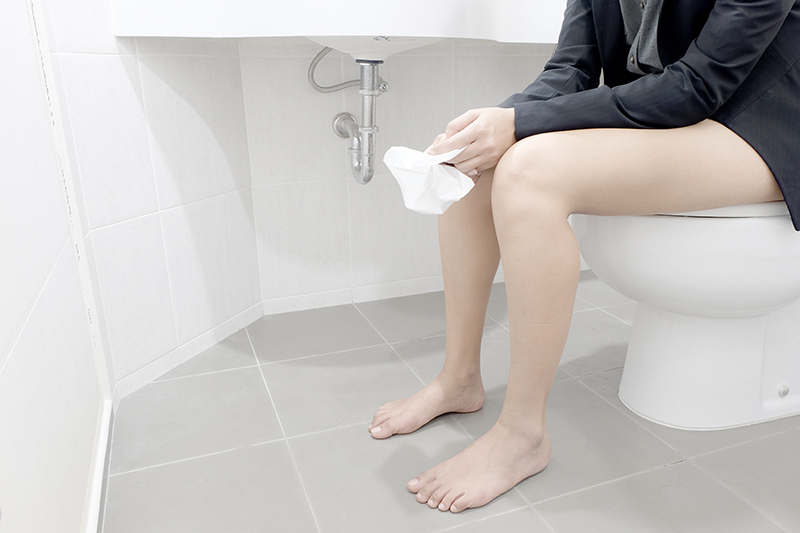Although occasional constipation is very common, some people may experience chronic constipation that largely interferes with their daily tasks. Chronic constipation may also cause excessive straining and pain to have a bowel movement. More importantly, if it is overlooked and left untreated, it can eventually lead to serious complications such as hemorrhoids and anal fissure (torn skin in the anus). Owning to relevant symptoms and complications considerably impair patient’s quality of life, being aware of warning signs of constipations contributes to appropriate and timely treatments.
Get to know constipation
In general perception, constipation might refer to some abnormal bowel movements such as absence of stool, reduced frequency in defecation, and hard stools which are difficult to pass. Not only these abnormal conditions, constipation also includes one of these manifestations:
- Having lumpy or hard stools.
- Passing fewer than three stools per week.
- Difficult stool passage defined as needing help or longer time to empty the rectum.
- Straining to have bowel movements which might be presented with bloody stool.
- Feeling that rectum is not completely empty after bowel movement.
Constipation has been frequently found in women rather men. It can actually happen at any age groups, with more incidences in working age.
Types of constipation
The causes of constipation are varied and may be multifactorial. The common approach categorizes constipation into 2 groups based on causes; primary and secondary constipations.
1. Secondary Constipation
Causes of secondary constipation are mainly related to organic diseases, systemic diseases or medications. Causes include:
- Obstruction of digestive tract ( such as cancer and stricture)
- Pregnancy
- Endocrine diseases and metabolic disorders such as diabetes and hypothyroid.
- Electrolyte imbalance such as and hypokalemia (low level of potassium in blood) and hypercalcemia (high level of calcium in blood)
- Medications, for examples: morphine derivative drugs, some antihypertensive agents, psychological medicines e.g. antidepressant, some chemotherapy drugs, antidiarrheal medicines, antispasmodic drugs, antacid and supplements containing all forms of iron.
- Neurological diseases such as Parkinson’s disease, multiple sclerosis, hemorrhagic or ischemic strokes and bed-ridden patients.
2. Primary Constipation
Major causes are intrinsic problems of colonic or anorectal functions which include:
- Constipation with normal transit, otherwise known as irritable bowel. Its incidence accounts for nearly 50% of all cases diagnosed with primary constipation. Altered sensitivity to nerve impulses in the rectum is also indicated in this group.
- Constipation with evacuation disorders caused by the malfunction of sphincter muscles. It has been found roughly 1/3 of patients with primary constipation. The abnormalities are generated due to weak muscles which cannot exert enough strain to pass stools and miscorrelation (contraction and relaxation) between the dynamic movement of anal sphincter muscles and pressure exerted by the rectum.
- Slow-transit constipation causes infrequent bowel movements (typically less than once per week). This is less common type of primary constipation.
Diagnosis of constipation
- Detailed medical history taking
- General physical exam and a rectal examination performed by gastroenterologist. A gloved, lubricated finger of specialist will be inserted into the rectum to examine reaction of nervous system around rectal areas and the function of some sphincter muscles. Patient will be asked to strain while evaluating the muscular strength.
- The following tests and procedures might be further used to diagnose chronic constipation and try to find the cause:
- Colonoscopy. With mild sedation, the examination of the rectum and entire colon uses colonoscopy, a flexible, camera-equipped tube to visualize the abnormalities and identify whether there is obstruction or stricture.
- Anorectal manometry. This procedure is used to evaluate anal sphincter muscle function that is required during stool passage. In this procedure, a narrow and flexible tube is inserted into the anus and rectum. It inflates a small balloon at the tip of the tube. The device is then pulled back through the sphincter muscle. This procedure allows gastroenterologist to measure the coordination between pressure exerted by the rectum and dynamic functions of muscles such as abdominal muscles, pelvic muscles and sphincter muscles.
- Colonic transit study. It is a test that evaluates the movement of colon. During this procedure, patient is asked to swallow a capsule that is attached with either a radiopaque marker or a wireless recording device. The progress of the capsule through the colon will be automatically recorded over several days and be visible on X-rays.
Treatment of constipation
After the diagnosis of constipation, selected treatment aims to correct constipation at its causes. Treatment for chronic constipation usually starts with diet and lifestyle modification. If those changes do not alleviate the symptoms, medications or surgery might be advised.
- Lifestyle changes include having stool passage immediately, taking enough time for defecation without distractions and without feeling rushed, sitting with proper positions while having bowel movement, increase fiber intake from consumption of fruits and vegetables, exercising and drinking enough water.
- Laxatives. There are several types of laxatives, each works differently to make it easier to have a bowel movement. Most commonly used laxatives are stimulant laxatives (cause intestines to contract), osmotic laxatives (help fluids move through the colon), rectal suppositories and rectal enemas. New laxatives include prokinetic agents (stimulate movement of colon) and secretagogues that stimulate the secretion of water and minerals into colon. Although most laxatives are considerably safe, it is highly suggested that all laxatives should be only prescribed by specialists. To purchase as OTC drug is not recommended.
- Anorectal Biofeedback training. This treatment program utilizes instrument-based and neuromuscular conditioning techniques to train muscle functions in rectal and relevant area in order to achieve regular bowel movements. Through the insertion of an anal probe, this training measures the pressure profile of the rectal sphincter muscles. The muscle functions during bowel movement will be immediately computed on the screen which can greatly help assisting the patients to learn about effective techniques to pass or hold stools healthily. In general, the total course of biofeedback training consists of 6 sessions and each session takes approximately 30 – 40 minutes. During training session, patients will be closely trained by expert gastroenterologist and nurses specialized in biofeedback training. Training involves appropriate sitting positions to encourage bowel movements and functions, abdominal breathing allowing breath to travel deeply into diaphragm and increase the pressure in abdomen and correct techniques for relaxation and contraction.
- Surgery. Surgery may be an option if other treatments failed in chronic constipation mainly caused by slow-transit or a blockage. Surgical removal of some part of the colon may be considered and it must be performed by highly experienced surgeons.
Constipation should not be ignored. If it is left untreated, serious complications may arise such as hemorrhoids, anal fissure, fecal impaction and rectal prolapse as well as other related diseases that affect to general health in a long run. If constipation is suspected, medical attention must be given as soon as possible.











